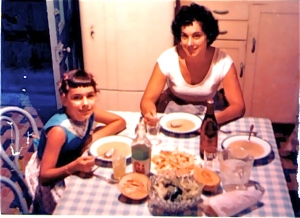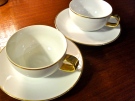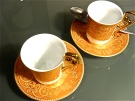The language we learn to speak as children is part of our identity and shapes our first thoughts and how we relate to the world around us.
In my case, it was Italian – or more precisely a north-eastern regional dialect from Friuli-Venezia Giulia. I spoke only a few words of English before starting school in Sydney’s inner-west and remember my mother farewelling me on my first day and crying – in Italian. Our home was TV-free until then, so – as an only child – I had limited opportunities to learn English.
One of my strongest Italian language memories was successfully landing the job of Kitchen Hand for my mother. Child labour laws didn’t apply to four-year-olds who made semolina dumplings and cut home-made pasta into long fettuccine strips. So I learnt to cook using Italian – not English – instructions.
Later, when I learnt more of the general Italian, I naturally picked up on various food idioms, some so florid they could be the basis of a four-course meal:
Pre-dinner drink
Non si puo avere la botte piena e la moglie ubriaca – You can’t have the wine cask full and your wife drunk
(You can’t have your cake and eat it too)
Appetiser
È buono come un pezzo di pane – He’s as good as a piece of bread
(He’s a good person)
Entree
Beccare con le mani in pasta – To catch with hands in the pasta
(To catch red-handed)
Main Course (choice of two)
Chi dorme non piglia pesci – He who sleeps does not catch fish
(The early bird gets the worm), OR
Ridi che la mamma ha fatto gli gnocchi – Ironic expression which means keep on laughing (even if you think there’s nothing funny to laugh at)
Last Thursday was INTERNATIONAL MOTHER LANGUAGE DAY, a UNESCO initiative observed annually on 21st February promoting linguistic and cultural diversity and multilingualism. Linguistic analysts predict up to 50 per cent of the world’s 7,000 languages may be in danger of disappearing by the end of this century. Australian Indigenous languages top the threatened list with only 20 of the original 250 still widely spoken. Once lost, they will be gone forever.
I sometimes wonder whether the regional dialect I speak with my mother and her friends will survive. When I cook Italian dishes I occasionally hear my mother’s voice in my head, speaking in dialect, saying something like “these potatoes are so watery they might ruin the gnocchi”.
These exchanges about food resonate so strongly with me and if I hadn’t learnt Italian, I’d be so disappointed that I’d be … hitting the sauce. In English.
See also Aidan Wilson’s International Mother Language piece in Crikey (Fully sic)














